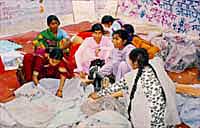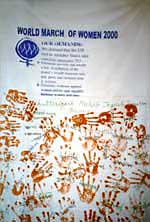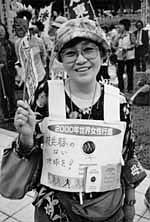April 2002 - Snapshots of Home and Elsewhere - Asia-Oceania
 |
|
India's vast geographic expanse, large population, and the dynamism of its women's groups were factors that contributed to the multitude of activities organized throughout the year 2000 and before. Two national coordinating bodies saw that information was circulated. They also sponsored countless workshops on the impact of the globalized neoliberal economic system on women's daily lives. 
Signatures on saris and dotis in India.In the Philippines, which also boasted two national coordinating bodies, GABRIELA framed its actions within the local political struggle, which led to the impeachment of President Estrada, and in the campaign to abolish the sex trafficking of women. Kilos Kabaro also addressed this issue. They organized marches and workshops on sex trafficking and on poverty. Kilos Kabaro defends Muslim women in Mindanao, a region marked by conflict and unrest. Sex trafficking of women was also an important issue for women in Nepal. As part of their national march on September 15, 2000, women victims of violence exhibited pieces of cloth containing their stories on a clothesline. Women in Thailand organized actions involving different communities, in particular, inhabitants of the shantytowns. In Laos, women distributed information on gender roles in education, human rights and ethnic minorities as part of a pressure campaign to get the government to implement affirmative action programs for girls in different organizations. They referred to theatre and also sports as areas where women and men come into contact with one another on an equal basis.
The difficulty of mobilizing in China and the absence of independent women's groups in that country prevented the March from establishing roots there. In Vietnam, the goals of the March were transmitted by the women's organization within the Communist Party that is currently in power. |

|
|
|
Copyrights
:
CC by-nc-sa 2.0
Last modified 2006-03-23 03:09 PM This item is available in Français, English, Español |




